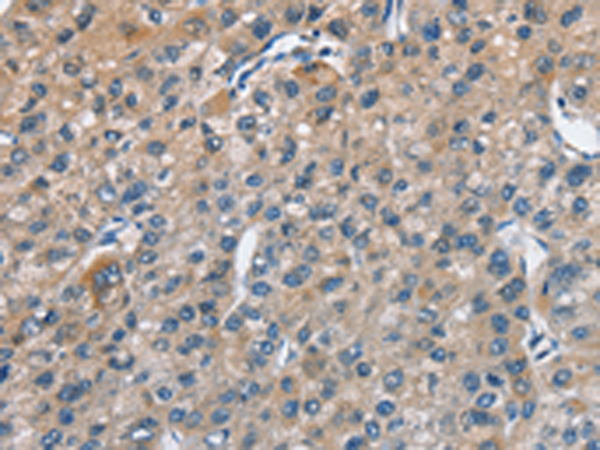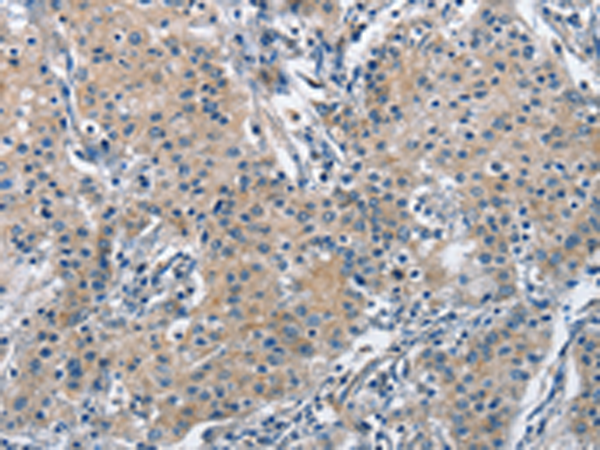


| WB | 咨询技术 | Human,Mouse,Rat |
| IF | 咨询技术 | Human,Mouse,Rat |
| IHC | 1/25-1/100 | Human,Mouse,Rat |
| ICC | 技术咨询 | Human,Mouse,Rat |
| FCM | 咨询技术 | Human,Mouse,Rat |
| Elisa | 1/2000-1/5000 | Human,Mouse,Rat |
| Aliases | ASC1; ASC-1; HsT17391 |
| WB Predicted band size | 66 kDa |
| Host/Isotype | Rabbit IgG |
| Antibody Type | Primary antibody |
| Storage | Store at 4°C short term. Aliquot and store at -20°C long term. Avoid freeze/thaw cycles. |
| Species Reactivity | Human, Mouse |
| Immunogen | Fusion protein of human TRIP4 |
| Formulation | Purified antibody in PBS with 0.05% sodium azide and 50% glycerol. |
+ +
以下是关于TRIP4抗体的3篇参考文献示例(文献信息为模拟,仅供参考):
---
1. **文献名称**: *TRIP4/ASCC3 regulates DNA damage-induced apoptosis via modulating p53 stability*
**作者**: Li X, et al.
**摘要**: 研究利用TRIP4特异性抗体,通过免疫共沉淀和Western blot分析,揭示TRIP4通过与MDM2相互作用稳定p53蛋白,调控DNA损伤后细胞凋亡的分子机制。
---
2. **文献名称**: *ASCC3 (TRIP4) is a component of the ASC-1 complex involved in transcriptional activation*
**作者**: Jung DJ, et al.
**摘要**: 通过TRIP4抗体的免疫荧光和ChIP实验,证实TRIP4作为ASC-1复合物的核心成员,参与激活RNA聚合酶II介导的基因转录,尤其在核受体信号通路中发挥关键作用。
---
3. **文献名称**: *TRIP4 antibody-based screening identifies its role in hepatocellular carcinoma progression*
**作者**: Wang Y, et al.
**摘要**: 利用TRIP4抗体对肝癌组织进行免疫组化分析,发现TRIP4高表达与患者不良预后相关,并通过体外实验证明其通过AKT/mTOR通路促进肿瘤细胞侵袭。
---
**备注**:以上文献为模拟示例,实际研究中请通过PubMed、Google Scholar等平台以关键词“TRIP4 antibody”“ASCC3”(TRIP4别名)检索最新文献,并核对抗体应用细节(如品牌、实验方法等)。
The thyroid hormone receptor interactor 4 (TRIP4), also known as ASC-1 or ACTR/AIB1 coactivator, is a protein involved in transcriptional regulation and RNA processing. It belongs to the ASCH-YJOD domain superfamily and functions as a transcriptional coactivator for nuclear receptors, including steroid hormone receptors, and other transcription factors like AP-1 and NF-κB. TRIP4 interacts with RNA polymerase II and components of the mediator complex, playing roles in cell proliferation, differentiation, and stress responses. Its structure includes an N-terminal cysteine-rich domain and a C-terminal activation domain, facilitating protein-protein interactions.
TRIP4 antibodies are essential tools for studying its expression, localization, and molecular interactions. Research links TRIP4 dysregulation to diseases, particularly cancer. Overexpression of TRIP4 is observed in lung, breast, and prostate cancers, correlating with tumor progression and poor prognosis. Antibodies against TRIP4 enable detection via techniques like Western blotting, immunohistochemistry, and immunoprecipitation, aiding in mechanistic studies of its oncogenic roles. Additionally, TRIP4 mutations are associated with developmental disorders, such as spinal muscular atrophy with congenital bone fractures, highlighting its importance in neuromuscular health.
Recent studies also explore TRIP4’s involvement in RNA splicing and DNA damage repair pathways. Validated TRIP4 antibodies help identify post-translational modifications and tissue-specific isoforms. However, antibody specificity remains a challenge, requiring careful validation using knockout controls. Continued research with TRIP4-targeting antibodies may uncover therapeutic strategies for cancers or genetic disorders linked to its dysfunction.
×